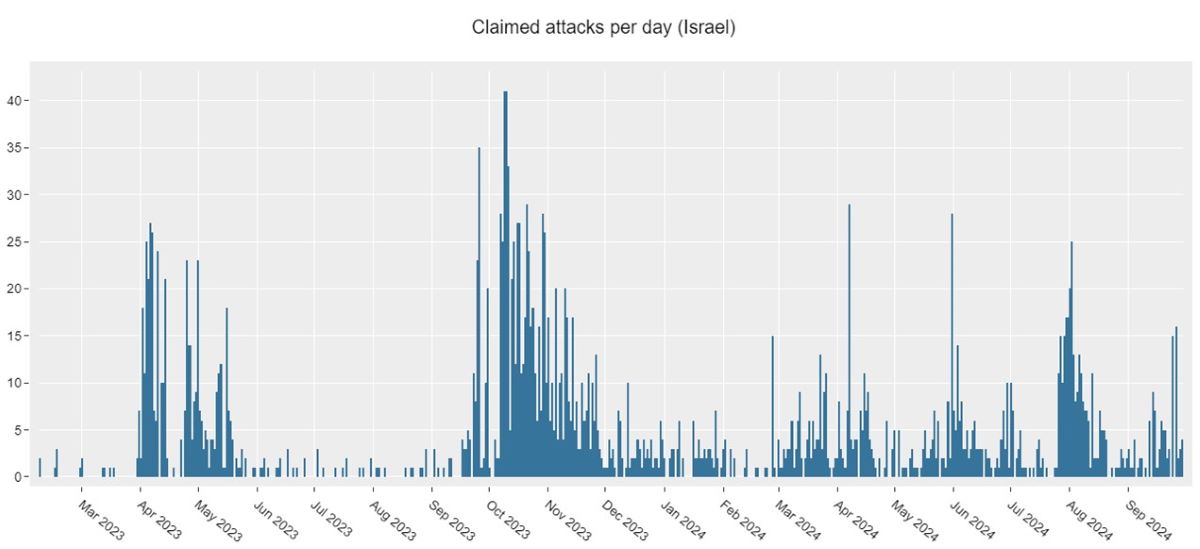As October 7 nears, organizations and institutions in Israeli and allied countries need to prepare for a potential surge in DDoS activity targeting their networks and websites.
Download now
Key Attack Insights:
- October 7, 2023, Attacks Triggered Major Cyber Retaliation: Israel’s retaliation following the Hamas attack led to an unprecedented wave of DDoS attacks by pro-Palestinian hacktivists, marking a significant escalation in cyber conflict.
- Longstanding Cyber Campaigns Against Israel: OpIsrael, initiated by Anonymous in 2012, laid the groundwork for continued hacktivist operations, with campaigns like OpsBedil in 2021 and 2022 revitalizing efforts to target Israeli organizations.
- Emergence of Patriotic Hacktivists: The Ukraine war sparked a new wave of "patriotic hacktivists," who have remained active and increasingly sophisticated. This trend has expanded, with pro-Muslim and pro-Palestinian groups forming alliances to launch coordinated cyberattacks.
- Evolving Hacktivist Tactics: Hacktivists are leveraging social platforms like Telegram to coordinate and share attack tools, leading to more organized and destructive cyber campaigns.
- Recent Regional Incidents Intensifying Cyberthreats: Ongoing tensions and recent incidents in the region involving Israel have heightened the likelihood of more coordinated and international cyberattacks. These developments could further galvanize Israel opposing hacktivist groups to escalate their activities.
- Heightened Cyberthreats Leading to October 7, 2024, Anniversary: Hacktivists have become more skilled in executing prolonged, high-intensity DDoS attacks. Israeli and allied organizations should anticipate increased cyber activity around the first anniversary of the October 7 attacks.
On 7 October 2023, Hamas and several other Palestinian nationalist militant groups initiated coordinated armed incursions from the Gaza Strip into southern Israel’s Gaza Envelope, marking the first invasion of Israeli territory since the 1948 Arab-Israeli War. The attack coincided with the Jewish holiday of Simchat Torah. Hamas and other Palestinian groups called the operation "Al-Aqsa Flood," while in Israel it has been referred to as "Black Sabbath" or the "Simchat Torah Massacre." Internationally, these events are often called the "7 October attacks."
As the sheer scale and brutality of the Hamas attack became clear over the following days, it was clear that Israel’s response would be equally unprecedented in scale and intensity. Since then, we have seen the Israeli offensive in Gaza and a war of attrition on Israel’s contested northern border.
The conflict did not go unnoticed by pro-Palestinian hacktivists. In response to Israel's retaliation, the country faced an unprecedented wave of DDoS attacks aimed at its organizations and institutions, reaching over 40 organizations targeted on both October 9 and October 10, 2023.
 Figure 1: Hacktivist DDoS attack claims per day targeting organizations in Israel (source: Radware)
Figure 1: Hacktivist DDoS attack claims per day targeting organizations in Israel (source: Radware)
OpIsrael, Since November 2012
Israel is no stranger to cyber campaigns. OpIsrael was initiated by Anonymous in November 2012 as a reaction to the Israeli military operation named Pillar of Defense. This operation, which lasted for eight days starting on November 14, 2012, was the Israel Defense Force's response to the firing of 100 rockets at Israel from the Hamas-controlled Gaza Strip within a single day. Initially, OpIsrael served as an informal battle tag adopted by a collective of hacktivists from Anonymous to counteract the Israeli military action. The 2012 operations by Anonymous saw numerous Israeli websites suffer from data breaches, defacements and denial-of-service attacks.
In the subsequent year, Anonymous decided to formalize OpIsrael into an annual campaign aimed at Israel, marking its commencement on April 7, 2013, a date that coincided with Holocaust Remembrance Day. Their stated objective was to "erase Israel from the internet" by targeting Israeli networks and applications due to what Anonymous claimed were human rights abuses against Palestinians, with the broader aim of highlighting the Israeli-Palestinian conflict.
Almost a decade later, following the downfall of Anonymous and the lack of support for OpIsrael, a group of pro-Muslim hacktivists from Southeast Asia launched a new campaign called OpsBedil to fill the void. In 2021, cyberattacks were mainly reactionary in the Middle East, with minor cases of hacktivism in the region typically following physical or political confrontation. Specifically, OpsBedil was a political response by DragonForce Malaysia to the Israeli ambassador to Singapore stating that Israel was ready to work towards establishing ties with Southeast Asia’s Muslim-majority nations. As a result, the group and several affiliates launched a series of...